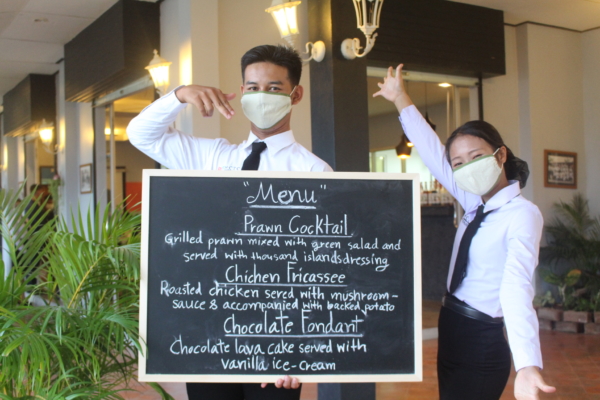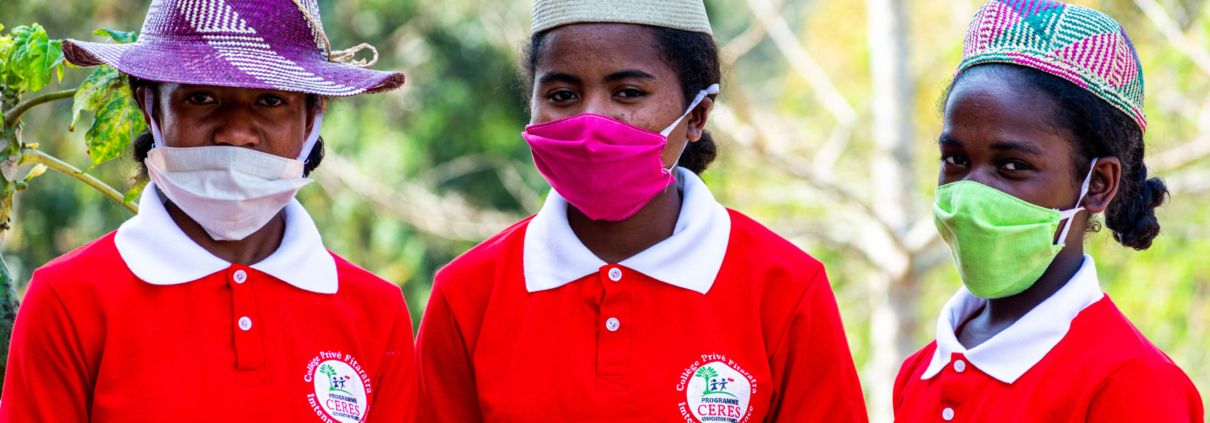Report on a new school year unlike any other: solutions for young people and their teachers at the start of the 2020-2021 school year in the IECD’s countries of intervention.
November 2020 – Much more than a health crisis, the COVID-19 crisis is causing a global economic, social and humanitarian crisis. At the heart of all countries’ concerns is the continuity of education, essential for ensuring recovery after the crisis. In three-quarters of the IECD’s countries of intervention, young people have been able to return to school. The IECD’s teams have adapted to the new rules and have learned lessons from the first lockdown and are even prepared for possible further restrictions that may arise during the new school year. Thus, innovative, structured and sustainable practices have been set up.
The reopening of schools at the start of the new school year: a moment much awaited!
In Madagascar, the school year started in October 2020 for the CERES, which brings together five educational centers for junior and high school students. Mr. Charly is a history and geography teacher there: “Despite everything, the new school year is going well and I am optimistic about the rest of the year. With the sanitary and educational measures that have been introduced, we’ve been able to manage most difficulties and the students have everything they need to ensure that they succeed their final year at junior school and the BEPC mid-school exam.”
New teaching conditions
In Lebanon, the General Department for Technical and Vocational Teaching has reduced the number of weeks of classes from 30 to 20, and the duration of each class from 50 to 30 minutes. The Ministry of Education has also organized classes divided up into several groups alternating between face-to-face classes and remote classes. Thus, the IECD’s teams in Lebanon have reworked the training programs and adapted them so that the young people are able to benefit from high-quality and coherent training despite the reduction in teaching time. Similarly, Egypt and the Palestinian Territories have organized classes that alternate between face-to-face classes and remote classes.
New teaching methods
Mr. Charly explained to us that at the CERES center a “zero sequence” was created before the new school year to allow young people to catch up what they had missed during the first lockdown and previous crises (plague epidemic two years ago and strikes by teachers last year). “We have now reached the half-way stage in this sequence and I am very satisfied. The students have managed to catch up, they are learning quickly and well, and they are motivated”.
The new teaching methods promoted by the IECD aim to adapt to the restrictions but also to anticipate a possible further lockdown already being discussed in some countries and already introduced in Lebanon on November 14. In Egypt, the Soft Skills course by UN Women has been implemented by the IECD and delivered remotely for the 109 young people participating in the Seeds of Hope project, which trains young people without any qualifications in careers in energy.Khaled Waleed, a 15 year–old student in electrical maintenance at the ElectroMisr ATS schoolexplains: “Before, I was unable to communicate or deal with anyone other than my friends. Now I feel that I can take initiatives and I have also learned to take the lead. In general, I feel I now know how to work on myself and develop my skills. I know the path to follow!”
In Palestine, the Hamawi center provides assistance to 6 to 18 year-olds who have dropped out of school. It now welcomes young people with a new support for autonomy program in addition to the existing schooling support program, which completes the course at the neighboring school. Indeed, with the new measures that have been introduced, children are at home every other week and have to work on their own, a difficult exercise for those who live in difficult conditions (large families, lack of space and a peaceful environment for studying, absence of help, and more). Therefore, additional three-hour support has been set up: the students first of all meet to work on stress management and create a team spirit with the help of games. They then watch their lessons in a group before working on their exercises on their own. At the center, two teachers help them do their exercises and prepare any questions they may want to ask when they return to face-to-face classes at the neighboring school.
Teacher training
Teaching methods are constantly evolving and it is one of the IECD’s missions to support teachers in their implementation. In Egypt, in August and September 2020, the IECD delivered courses for 42 teachers and administrative staff at three partner schools with a view to improving the teachers’ skills in Microsoft Office and Internet searches. The grades showed an 80% increase in the teachers’ skills. At the same time, the three partner public schools benefited from the installation of Internet connections so that the teachers are able to access new resources and prepare relevant content for students’ online learning.
Support for alumni in finding work
The new school year has been eventful for young people still at school but also for young graduates,with this health crisis creating a great deal of uncertainty in the labor market.
In Thailand, 60% of alumni from the Mae Sot hospitality school experienced a cut in their wages as a result of the crisis and 8% lost their jobs. In addition to personalized follow-up for the placement of each young person, the school also offered financial aid for graduates to cover their basic needs: $80/month for buying a hygiene kit (including masks) and food.

The new class of the Mae Sot Hospitality School, proud to present the day’s menu on the day the school reopened on July 2020
In Madagascar, after a three-month lockdown and the complete shutdown of tourism, 28% of former students from the La Rizière Hospitality School earned full pay compared to 90% before the crisis in March 2020. The majority of graduates found themselves out of work and without any source of income. To deal with this situation, the IECD has opted for several solutions: in the short-term, emergency food aid for alumni most at risk; in the medium-term, the deployment of training in entrepreneurship to help alumni who want to start a small business; and, in the long-term, the overhaul of training courses in order to include more skills that can be transferred to the labor market (cooking in corporate or hospital environments, communication, basic management skills, etc.).
The economic model of school also has to change
In Thailand and Myanmar, the COVID-19 crisis has impacted hospitality-catering schools that operate according to a social enterprise training model. These have seen a strong decline in their income following the closure of borders and the drop in tourism. Today, a great deal is being done to attract a local clientele to replace foreign visitors. Thus, products and prices are reviewed so as to be more attractive for this new audience. In Vietnam, a new sales basket in the bread-making sector and a new BtoC license have been developed helping to boost sales.
Conclusion
The challenges for young people, their teachers and the schools that welcome them are huge: how to offer high-quality training and a course based on hands-on experience despite the restrictions? How to prepare young people to enter a job market that is being reshaped, with strengths and players that remain to be redefined? The IECD’s teams work every day to find, design and deploy effective solutions alongside their partners in the field. Determined to meet these challenges, the IECD is now, more than ever, playing its role in Sowing the Seeds of the Future.
Join us!

